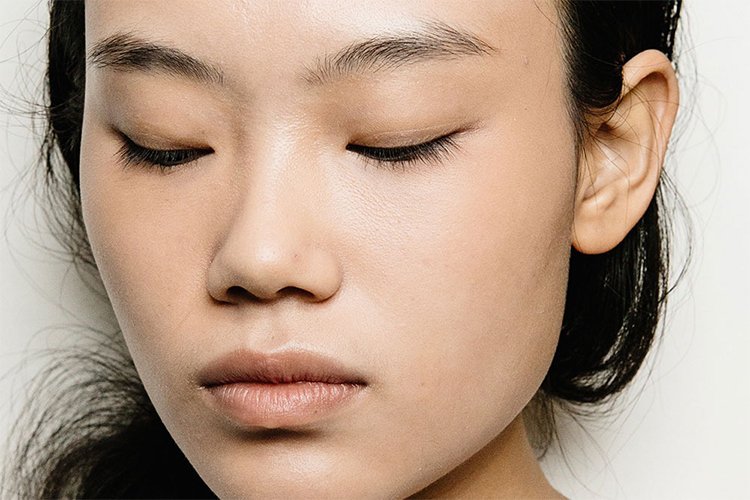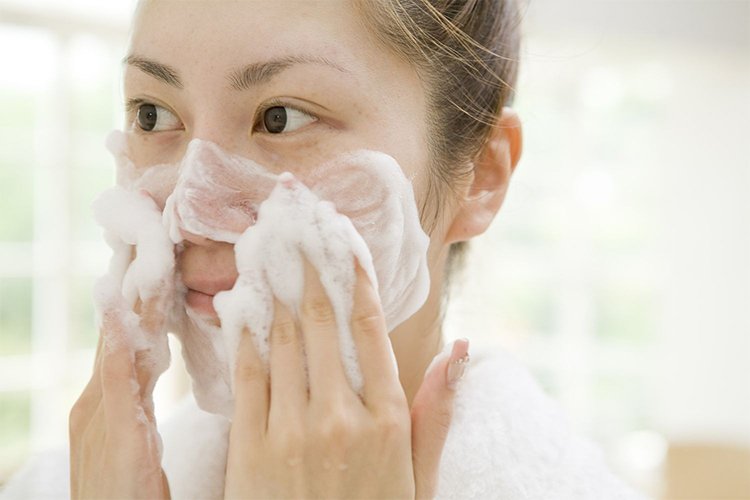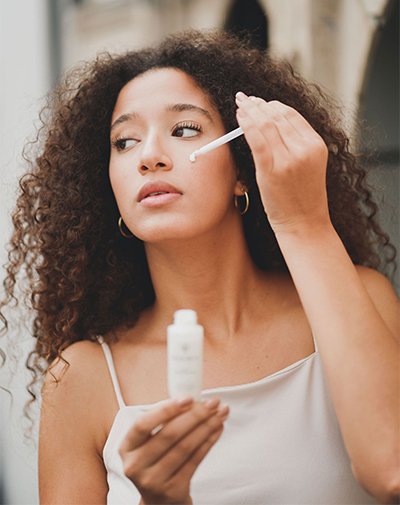Do you ever get nostalgic for the days when all you knew about the “beauty industry” was that you loved applying your purple glitter eyeshadow with the little foam applicator? I feel the same way. These days, it can be so hard to figure out which beauty products are legit and which are scams that it completely takes the fun out of something we used to do just because we loved it. How do you know if a product is actually effective or not? How can you tell if the vitamin C serum you’re buying was ethically made? Our five-year-old selves, who sat in front of our Barbie mirror putting on makeup for fun, didn’t have to worry about any of that, so why do we?
As it turns out, there are a few warning signs in beauty product marketing and packaging that can tell you immediately if a product is worth your hard-earned money. On the Everygirl Podcast, we spoke to Dieux skincare founders Charlotte Palermino and Joyce de Lemos about the biggest beauty product red flags that should immediately flag a product as a no-go for your routine. Here’s what to look out for so you can keep your inner child’s joy in your beauty routine and leave the stress behind.
1. Active ingredients in clear glass packaging
Active ingredients play a huge role in skincare these days, and chances are you already have one or two of them in your routine. From vitamin C to retinol to alternatives like bakuchiol, active ingredients are used in skincare products to treat a specific issue. For example, retinol is often used to treat acne or fight fine lines. However, the packaging of a skincare product that uses a powerful active ingredient is extremely important.
When looking at skincare products with powerful ingredients, make sure they are bottled in opaque packaging. “If an ingredient is supposed to be very active, powerful, and effective and it comes in a clear glass package, that’s a no-go,” de Lemos said on the Everygirl Podcast. “That powerful ingredient is definitely going to break down once the sun hits it.” To ensure you get what you paid for with your active ingredients, they need to be in protective packaging that prevents sunlight from damaging the product. In fact, de Lemos recommends looking for products that are also protected from air and don’t contain glass droppers. Opaque packaging with an airless pump is your best bet.

2. Unrealistic claims and fearmongering
It should go without saying, but a skincare product isn’t going to change your entire life or your entire face. There’s plenty of beauty marketing out there, from billboards to TikTok, that would like you to believe otherwise. However, if a product claims to completely eliminate your skincare woes, alarm bells should be ringing. “The sad reality is that shame and fear are incredible purchase motivators,” Palermino said on the Everygirl Podcast. If you see a beauty brand throwing around anti-aging rhetoric—we’re all aging anyway!—or claiming their product is the holy grail that will cure your lifelong struggle with hormonal acne, that’s a problem. No skincare product should have to trick you into buying, so always look for brands that are as honest as possible about what their product can and can’t do. If in doubt, consult your dermatologist.
3. Mineral sunscreens with too much butyloctyl salicylate
This point is specific, but worth knowing given the internet’s recent furor over chemical and mineral sunscreens. To sum up the drama: In 2019, the FDA proposed revising sunscreen active ingredient requirements, and claims circulated online that mineral sunscreens were inherently better for you than chemical sunscreens. “The FDA asked for more information, and there was a fierce battle to demonize chemical sunscreens in order to sell mineral sunscreens,” Palermino said. “I love mineral sunscreens, but if you look at a lot of these mineral sunscreens, this one has an ingredient, butyloctyl salicylate, that is the equivalent of a chemical sunscreen filter.”
In other words, if you check your 100% mineral sunscreen and it has a lot of butyloctyl salicylate, it’s practically a mirror image of a chemical sunscreen. While Palermino acknowledges that it’s ridiculous that consumers are forced to be their own investigative journalists in cases like this, it’s best to at least be able to check those ingredients. That way, you can make a truly informed decision about whether a chemical or mineral sunscreen is right for you.

4. Unregulated testing processes
The beauty industry is huge, so it’s harder than ever to know if a brand has adequately tested its products and ingredients. As co-founders of Dieux, Palermino and de Lemos are experts on what it looks like when not only the ingredients in their skincare products, but also the ingredients in their packaging, are scrutinized before a product is released to market. “We have a full testing process, not even for the final product that we put on the shelf, but there’s also a toxicology test that all the different ingredients in the products have to pass,” de Lemos said. Ideally, all the skincare products you buy should go through multiple rounds of testing before they make their way to your bathroom counter.
According to Palermino, more FDA regulations on skincare testing are necessary because it’s so easy to sell skincare products online that haven’t undergone any testing at all. Of course, it’s one thing for a skincare brand to simply follow the law, and another for them to go the extra mile with their testing and transparency—but in an ideal world, every skincare brand would follow a testing process as rigorous as Dieux. If you visit the website of the brand you’re considering purchasing and can’t find detailed information about their testing process, consider that a red flag.
5. Counterfeit Products
We’re all familiar with the idea of a “counterfeit” attempt by the beauty industry, but what happens when there are actual counterfeit products for sale? There’s a difference between one brand mimicking another’s formula and packaging and complete fakes being passed off as the real thing online. If you buy a skincare product directly from the brand or from a store like Sephora or CVS, you can usually trust that you’re not being sold a fake. However, Palermino cautions against ordering skincare products from Amazon, as it can be very difficult to determine whether or not they are real. “Buying skincare products from Amazon is usually a no-go for me, as it’s really hard to make sure you’re not buying a fake,” she said. “It’s not that you can’t buy anything from Amazon. It’s more that you have to do that due diligence.”
If you have any doubts about whether or not a product is real, consider buying that particular item direct from the consumer. Going through the ingredients list on Amazon to save a few bucks on a potentially fake product is certainly not worth your time. While you don’t have to be your own investigative journalist, double-checking should be your default setting when there are fakes on the market. And who knows? If enough brands follow Dieux’s lead, hopefully we can get back to the real fun of beauty at some point.

